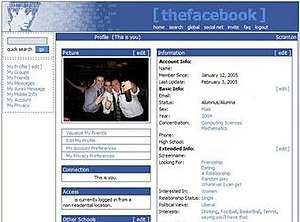What Facebook Really Means
I’ve been spending a lot of time lately thinking about Facebook and the implications it has on our daily lives, our communications, and our buying behavior. I’m starting to come around to the belief that Facebook truly is, first and foremost a data company in addition to being a portal for social news and activity. That’s really it and its nothing we don’t already know. Facebook will most certainly evolve and offer more compelling features like daily deals, FB credits, or even a mobile OS, but at the core, their foundation is simple. My friend Brad has been thinking about what this means in the context of historical companies and products, so I extended this line of thinking to see what I’d come up with and here is where I currently stand.
AOL vs. Facebook
AOL was first and foremost an ISP in addition to being a closed portal to various content and communications channels. Users were able to log in to their AOL account and then immediately access things like their AOL profile (what is now Facebook), their Instant Messaging and away messages (what is now Twitter), their news (what is now every news site out there), their mail (what is now GMail), their games (what is now Zynga), their chat rooms (what is now BBM, SMS, Meebo), etc. What started off as an ISP quickly became a portal for various components of one’s digital experience and to me, this is starkly similar to Facebook.
Facebook on the other hand started out as first and foremost a data company in addition to being a portal to various social content and news feeds. Users are able to log into their Facebook account and engage their entire social network of friends. Perhaps the biggest difference between Facebook and AOL is that Facebook lets users carry their identity with them online, while AOL did not. So today, if a user wants to read the news, or play games, or chat with their friends, they can do so under a uniform identify that is portable across many digital platforms. To me, this is nothing more than a driver’s license for the web which in time will become a credit card for the web.
With this said, I think its interesting to see what happens when you slightly modify the rules of open vs. closed. AOL was a very closed environment and it was only a matter of time before it got hacked up into new, competing companies. Facebook however, although still very much closed, is enabling others to access its rich database thus making it a platform for a greater social web – a Driver’s License. Other than that, I’m not sure what other interesting take aways we can learn from this comparison.
Microsoft vs. Facebook
Microsoft was a software company built to manage productivity and utility. At its core, it had an operating system that enabled specific apps which were all designed, in some way shape or form, to enhance one’s ability to be productive by leveraging digital connections on the internet, and within the very PC (between memory, the hard disk drive, CD rom, etc). Productivity was the key word here and it fueled 10 years of growth (e.g. MS word, excel, IE, Powerpoint, etc).
On the other hand, Facebook is a data company built to manage and facilitate social connections. At its core, it is a centralized data base that houses self-declared information (e.g. age, gender, location, interests, etc), and on top of that data base, it has apps that are designed to leverage these pieces of information (e.g. groups, walls, friend recommendations, etc). “Social Connectivity” is the key word here and i think we can agree that it will fuel the next 10 years of growth.
With this said, I think the Microsoft vs. Facebook comparison is a little better than the AOL analogy but I’m still not sure it does us justice to understand the full effects of Facebook. I don’t think we should look at Microsoft as the comparison to gauge what Facebook means, but instead, I think we should be looking at historical events that involved social movements. Things like voting, protesting, activism, wars, diplomacy, fundraising, emergencies & triage (healthcare), events, etc. I think the next wave of innovation (on the consumer side of things) will be about taking timeless human events (like buying things) and overlaying a precise data set and pure social connectivity layer (e.g. Facebeook). Because in each one of these social events, there are very different use cases, with a very different way of using and looking at the data.




